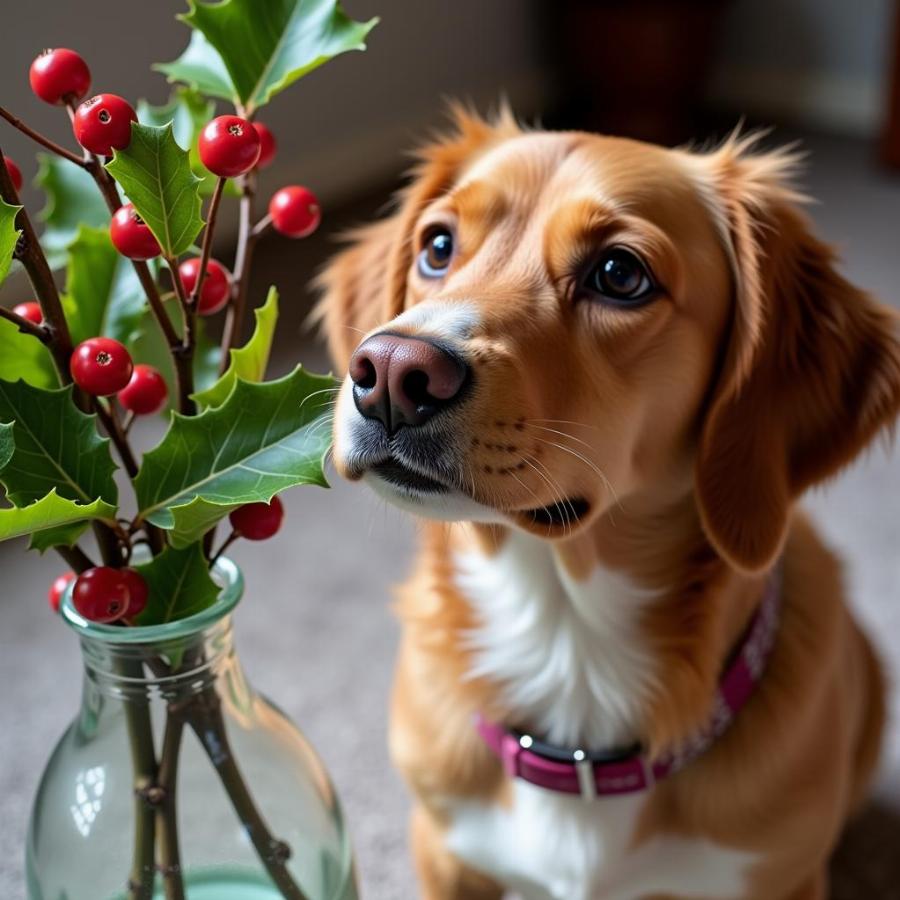The holiday season is a time for festive cheer, but it’s important to be mindful of potential hazards for our furry companions. While holly brings beauty to our homes, many pet owners wonder, “Are holly berries toxic to dogs?” The answer, unfortunately, is yes.
Holly, with its vibrant red berries and prickly leaves, contains toxins like saponins, methylxanthines, and cyanogenic glycosides. These substances can cause a range of unpleasant symptoms in dogs if ingested. Knowing the risks and how to prevent holly berry poisoning is crucial for keeping your canine safe during the holidays.
Understanding Holly Berry Poisoning in Dogs
Dogs are naturally curious creatures, and those enticing red berries can be too tempting to resist. However, even small amounts of holly berries can cause digestive upset and other health issues.
Symptoms of Holly Berry Poisoning
If you suspect your dog has eaten holly berries, watch out for these symptoms:
- Vomiting
- Diarrhea
- Drooling
- Loss of appetite
- Lethargy
- Abdominal pain
- Tremors (in severe cases)
What to Do If Your Dog Eats Holly Berries
If your dog exhibits any of these symptoms, contact your veterinarian immediately. Quick action is vital in treating holly berry poisoning.
Expert Insight: “Time is of the essence when it comes to treating potential poisoning in pets,” says Dr. Emily Carter, a veterinarian specializing in toxicology. “If you see your dog ingest holly berries, don’t wait for symptoms to appear. Contact your vet or the ASPCA Animal Poison Control Center (APCC) at (888) 426-4435 for immediate guidance.”
Preventing Holly Berry Mishaps
Prevention is always better than cure. Here are some tips to keep your dog safe from holly berry poisoning:
- Keep holly out of reach: Place holly decorations high up on shelves or in rooms your dog doesn’t have access to.
- Opt for artificial holly: Consider using artificial holly in your decorations to eliminate the risk entirely.
- Supervise your dog: Never leave your dog unsupervised around holly, especially puppies who are more likely to explore with their mouths.
- Train a strong “leave it” command: This command can be invaluable in preventing your dog from picking up dropped berries or chewing on branches.
 Dog Eyeing Holly Decorations
Dog Eyeing Holly Decorations
Other Holiday Plants Toxic to Dogs
Holly isn’t the only holiday plant that poses a threat to dogs. Other festive flora to be wary of include:
- Mistletoe
- Poinsettias
- Yew
- Amaryllis
- Lilies (extremely toxic to cats)
Creating a Safe and Joyful Holiday Season for Your Dog
The holiday season should be a time of joy for both you and your furry friend. By taking precautions and being aware of potential hazards, you can ensure a happy and healthy holiday for your canine companion.
Remember, if you suspect your dog has ingested holly berries or any other toxic substance, contact your veterinarian or the ASPCA Animal Poison Control Center immediately.
FAQs About Holly Berries and Dogs
Q: Are all parts of the holly plant toxic?
A: Yes, all parts of the holly plant, including the berries, leaves, and stems, are toxic to dogs.
Q: What should I do if my dog vomits after eating holly berries?
A: While vomiting can be a natural response to ingesting toxins, it’s essential to contact your vet for guidance. They can assess the situation and advise on the best course of action.
Q: Can dogs eat holly leaves?
A: No, holly leaves are also toxic to dogs and can cause similar symptoms to holly berries.
Q: How long do holly berry poisoning symptoms last in dogs?
A: Symptoms can last for 12-24 hours, but it’s crucial to seek veterinary care even if symptoms appear mild.
Q: What are some safe alternatives to holly for holiday decorations?
A: Consider using dog-friendly alternatives like pine branches (avoiding pine needles), paper decorations, or artificial plants.
Looking for More Dog-Friendly Holiday Tips?
Check out our articles on:
Beaut Dogs: Your Trusted Source for Dog Care Information
Beaut Dogs is your one-stop resource for all things dog-related. We provide reliable and insightful information to help you care for your canine companion in the best way possible. For any further questions or concerns, please reach out to us at [email protected].